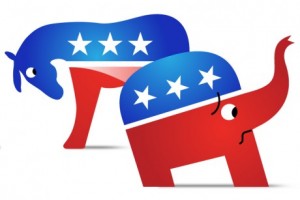Independent in name only?

The ranks of Independent voters are rising nationwide. In Massachusetts, they are the majority. According to the state's most recent enrollment statistics, released by the Secretary of the Commonwealth late last week, 52.18% of Massachusetts' registered voters are “unenrolled,” refusing to affiliate with any political party. Democrats are the second largest block of registered voters in the state, accounting for 35.9% of the total. Just 11.6% of the state's voters affiliate with the GOP.
Over the course of the last three decades, there has been a steady increase in the number of unenrolled voters in Massachusetts, which appears to have come at the expense of the Democratic party's rolls. In 1982, Democrats accounted for the largest segment of registered voters in the state – at 45.5% –, but Independents were not far behind, making up 40% of the electorate, while Republican affiliation stood at 14.5%.
By 1992, the unenrolled were already the largest block of registered voters in the state, outnumbering Democrats by a significant margin. That year, 46% of the state's opted not to register with any political party, while 40% were registered Democrats and 13% were Republicans.
Ten years later, Independents were on the verge of constituting an outright majority of the state's voters. In 2002, 49% of Massachusetts voters were not enrolled in any party, while 36% remained registered Democrats and just 13% were members of the GOP.
Yet, despite these numbers, Massachusetts is of course a Democratic bastion. Senator Scott Brown is the only Republican in the state's Congressional delegation as well as the only Republican to currently hold a statewide elected office. The state legislature is dominated by the Democratic party. In the 160 seat House, Democrats hold a 127 to 33 majority over the GOP. In the State Senate, there are 36 Democrats and 4 Republicans.
Yet, despite the fact that barely 1 in 10 Massachusetts voters is registered with the GOP, Republicans remain relatively competitive with Democrats in the state's elections. For example, in the commonwealth's 2010 gubernatorial election, incumbent Democrat Deval Patrick won with a plurality of 48%. But Republican Charlie Baker was not very far behind, with 42% of the vote, while Independent candidate Tim Cahill received a modest 8% support and Green Rainbow party candidate Jill Stein trailed with 3%.
Though it may sound counter-intuitive, Independent and third party candidates for office may have the best chance of success in Democratic and Republican party strongholds such as Massachusetts or Utah, where the minority party, or whatever is left of it, is not seen as a viable alternative to the majority party. In Massachusetts, as in many other states across the country – the two-party system is in fact a one-party state. And, in fact, there were noteworthy third party and Independent candidates in six of the ten races for the US House in Massachusetts.
If those who have already unenrolled from the major parties were to support alternatives, it would provide further incentive for worthy candidates and help to open up the political system, while potentially delivering an electoral upset. The unenrolled do not do so in large numbers, however.
Does that mean that they are Independent-in-Name-Only?




